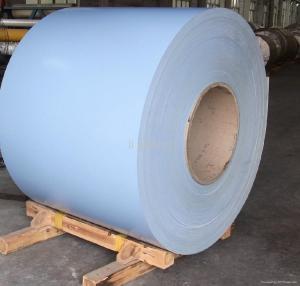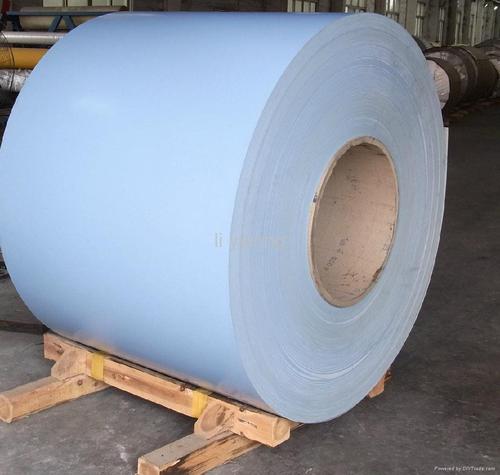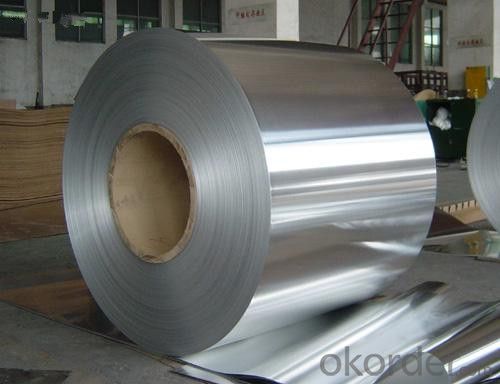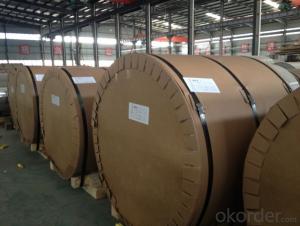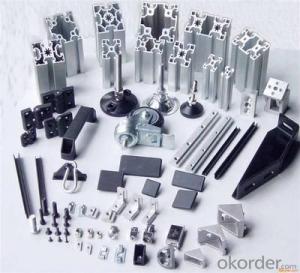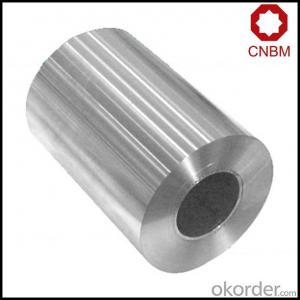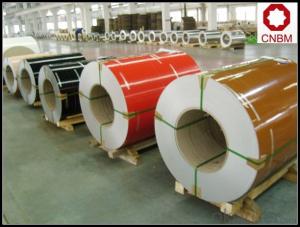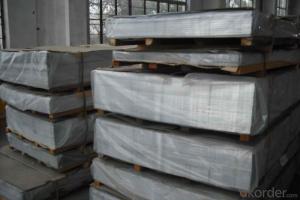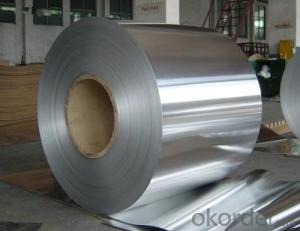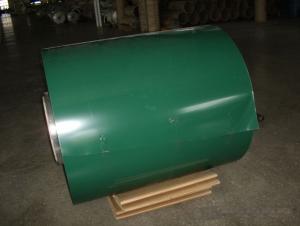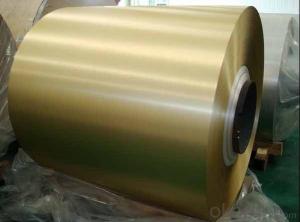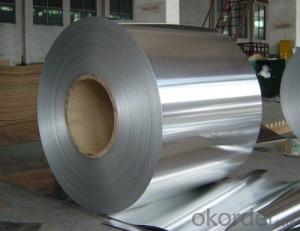14 Aluminum Coil Grey Color Coated Aluminium Roll for Aluminium Composite Panel
- Loading Port:
- Shanghai
- Payment Terms:
- TT OR LC
- Min Order Qty:
- 2 m.t.
- Supply Capability:
- 50000 m.t./month
OKorder Service Pledge
OKorder Financial Service
You Might Also Like
Specification
Color Coated Aluminium Roll For Aluminium Composite Panel
Specifications
Grade | 1050,1060,1070, 1100, 1200, 2024,3003, 3004,3005, 3105, 5005,5052 5182,5754,8011 etc |
Thickness | 0.1~1.5mm |
Width | 100~2500mm |
Surface Treatment | PVDF and PE coated |
Temper | O-H112 |
Hardness | More than 2H |
Yield(≥MPa) | 160 |
Ultimate Strength(≥MPa) | 175 |
Elongation(≥%) | 6 |
Packing Material | Moisture-proof agent, steel tape bundle, wooden pallet, brown paper |
Method | Vertical(eye to sky) or horizontal(eye to wall) |
Standard Specification | 1000mm×C, 1200mm×C, etc |
Shipping | Container Loading or Bulk Pack |
Characteristics
1) Excellent weather-proof durability
2) Anti-ultraviolet
3) High erosion resistance
4) Stable color and gloss
5) Good mechanical processing performance
6) Abrasion resistance
7) Anti-impact
8) High flexibility
Application
1) Construction material further processing
2) Solar cell frame, solar battery frame
3) Glass curtain wall frame
4) Interior decoration
5) Elevator decoration
6) Signs, nameplate, bags making.
7) Automobile parts material
8) Office and Household appliances: HVAC equipments
9) The consumer electronics: mobile phones, digital cameras, MP3 .etc.
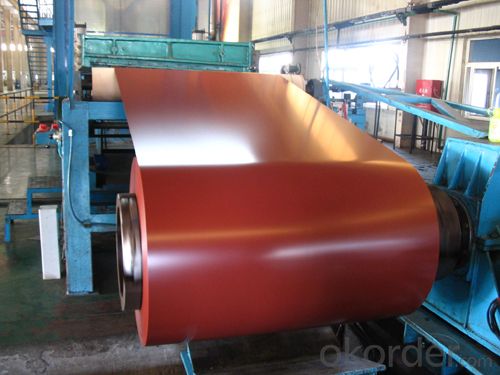
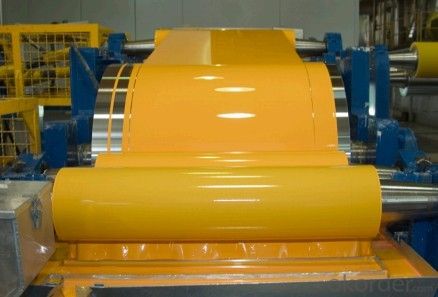
Coating varieties
Polyester Coatings (PE)
PE (polyester) coatings exhibit an excellent combination of hardness, flexibility, flow, appearance, and superior resistance to dirt retention in indoor and outdoor applications. These coatings are highly resistant to abrasion, metal marking, staining, and marring, and require minimal maintenance. Glazetech uses polyester paints which provide excellent colour and gloss retention properties.
Polyvinylidene Fluoride Coatings (PVDF)
PVDF (polyvinylidene fluoride) is a chemical resistant thick film barrier coating commonly used in architectural applications where both excellent appearance and substrate protection must be maintained over a long period of time. This coating is unaffected by most chemicals and solvents and has excellent wear and abrasion resistance. PVDF also has a high dielectric strength, excellent resistance to weathering and the ability to self extinguish.
FAQ
--Q: Do you provide free samples?
--A: Yes, free samples will be sent to you on freight at destination.
--Q: Can I get your latest products catalogue?
--A: Yes, it will be sent to you in no time.
--Q: What is the MOQ?
--A: 2 tons
--Q: What are your payment terms?
--A: We accept L/C, T/T.
--Q: What kinds of alloy can you supply?
--A: 1000 series: 1050, 1060, 1070, 1100, 1145, 1200
3000 series: 3003, 3004, 3105, 3104
5000 series: 5052, 5083, 5754, 5182
6000 series: 6061, 6063, 6062, 6063
8000 series: 8011, 8021
--Q: What’s the coating of top side?
--A: PVDF and PE coating
--Q: What kinds of temper can you supply?
--A: O-H112: O,H12,H14,H16,H18,H22,H24,H26,H,32,H34,H111,H112, T3, T4, T6
- Q: What is the typical coefficient of friction for aluminum coils?
- The typical coefficient of friction for aluminum coils can vary depending on various factors such as the surface it is in contact with, the presence of lubricants, and the specific conditions of the application. However, aluminum generally exhibits a low coefficient of friction, usually ranging from 0.2 to 0.4.
- Q: How much does it cost to extract aluminium from its raw ore? Also how much does extracted aluminium sell for? I cannot find this anywhere on the internet. I would really appreciate some help.
- These are the points to think about: The high cost of the process because of the huge amounts of electricity it uses. This is so high because to produce 1 mole of aluminium which only weighs 27 g you need 3 moles of electrons. You are having to add a lot of electrons (because of the high charge on the ion) to produce a small mass of aluminium (because of its low relative atomic mass). Energy and material costs in constantly replacing the anodes. Energy and material costs in producing the cryolite, some of which gets lost during the electrolysis. The key cost of the electrolysis and the cost of electricity. This will depend which country you are in, which you don't tell us. If freely available hydroelectric power is available, this makes a huge difference. IF you are in the US, the costs of extracting aluminium or any metal is 70% to 95% of the current market value. Aluminium is selling at about $1500/tonne, then the cost of extracting it can be around $1200/tonne.
- Q: Can aluminum coils be used in the production of cryogenic storage tanks?
- Cryogenic storage tanks can incorporate aluminum coils, as aluminum is a suitable material for such purposes. This is due to its low density, high thermal conductivity, and excellent resistance to corrosion. These attributes make it an excellent choice for the storage and transportation of cryogenic liquids like liquid nitrogen, oxygen, and argon. Aluminum coils can be utilized to construct the internal shell of the tank, which offers a lightweight and durable solution. Moreover, aluminum is highly malleable, enabling the creation of intricate tank shapes and designs. However, it is crucial to consider that aluminum has a higher coefficient of thermal expansion compared to materials such as stainless steel. Therefore, adequate design measures must be implemented to accommodate thermal contraction and expansion during cryogenic operations.
- Q: Are there any specific regulations or standards for aluminum coil production?
- Yes, there are specific regulations and standards for aluminum coil production. These regulations and standards are put in place to ensure the quality, safety, and sustainability of the production process. One of the most important standards for aluminum coil production is the American Society for Testing and Materials (ASTM) International standard. ASTM B209 is the standard specification for aluminum and aluminum-alloy sheet and plate, which includes the requirements for aluminum coil production. This standard specifies the chemical composition, mechanical properties, and other technical requirements that the aluminum coil must meet. In addition to ASTM standards, there are also regulations and standards set by regulatory bodies such as the International Organization for Standardization (ISO) and the Occupational Safety and Health Administration (OSHA). ISO 9001 is a widely recognized standard for quality management systems, and ISO 14001 is for environmental management systems. These standards provide guidelines and requirements for the production process to ensure quality, environmental responsibility, and worker safety. Furthermore, specific regulations may vary by country or region. For example, in the United States, the Environmental Protection Agency (EPA) regulates the emissions and waste disposal associated with aluminum coil production through the Clean Air Act and the Resource Conservation and Recovery Act (RCRA). These regulations aim to minimize the environmental impact of the production process. Overall, the regulations and standards for aluminum coil production are in place to uphold the quality, safety, and environmental sustainability of the industry. Compliance with these regulations and standards is essential for manufacturers to ensure that their products meet the required specifications and are produced in a responsible manner.
- Q: Can aluminum coils be used for automotive heat shields?
- Automotive heat shields can indeed utilize aluminum coils. Aluminum, known for its outstanding thermal conductivity and high melting point, is frequently employed as a heat shield material. Its lightweight nature and remarkable resistance to corrosion make it particularly well-suited for automotive purposes. By effortlessly molding aluminum coils into the desired configuration, effective heat insulation can be attained, safeguarding delicate components from the engine or exhaust system's excessive heat. Moreover, aluminum is cost-efficient and easily accessible, contributing to its widespread preference as an automotive heat shield material.
- Q: Classification of aluminium rolls for aluminium rolls
- On behalf of 6061, mainly contains two elements of magnesium and silicon, so it focuses on the advantages of the 4000 series and the 5000 series, and the 6061 is a cold treatment aluminum forging product, which is suitable for applications with high corrosion resistance and oxidation resistance.
- Q: What are the typical lead times for aluminum coil orders?
- Lead times for aluminum coil orders can vary due to several factors. Standard orders typically take anywhere from a few weeks to a few months to fulfill. The size and complexity of the order, availability of raw materials, production capacity of the supplier, and any customization requirements all influence these lead times. Larger or more specialized orders may have longer lead times, especially if they need extra processing or finishing. Transportation and logistics can also affect lead times. To obtain an accurate estimate for a specific aluminum coil order, it is advisable to directly communicate with the supplier.
- Q: Can aluminum coils be used for solar panel applications?
- Yes, aluminum coils can be used for solar panel applications. Aluminum is a lightweight and durable material that is commonly used in the construction of solar panels. It is an excellent conductor of electricity, making it ideal for capturing and conducting solar energy. Aluminum coils can be used as a backing material for solar panels, providing structural support and helping to dissipate heat. Additionally, aluminum has good corrosion resistance, which is important for solar panels that are exposed to various weather conditions. Overall, aluminum coils are a popular choice for solar panel applications due to their strength, conductivity, and resistance to corrosion.
- Q: Is it possible to utilize a magnetic stirrer to determine the magnetic characteristics of an aluminum coil?
- <p>No, you cannot use a magnetic stirrer to test the magnetic properties of an aluminum coil. Aluminum is a non-magnetic material, meaning it does not respond to magnetic fields in the way magnetic materials like iron, nickel, or cobalt do. A magnetic stirrer operates by creating a rotating magnetic field to stir substances, but since aluminum is non-magnetic, it will not be affected by the stirrer's field. To test magnetic properties, you would need to use materials that are ferromagnetic or paramagnetic, or employ other methods such as a magnetometer for measuring magnetic fields.</p>
- Q: Are aluminum coils suitable for insulation purposes?
- Yes, aluminum coils are suitable for insulation purposes. Aluminum is a highly effective conductor of heat and electricity, making it an ideal choice for insulation. Aluminum coils can be used in various applications such as HVAC systems, refrigeration units, and electrical wiring. The coils are typically coated with a layer of insulation material such as polyurethane foam or fiberglass to enhance their insulating properties. The combination of aluminum and insulation helps to prevent the transfer of heat or cold, providing excellent thermal insulation. Additionally, aluminum is lightweight, durable, and resistant to corrosion, making it a reliable choice for long-term insulation needs.
Send your message to us
14 Aluminum Coil Grey Color Coated Aluminium Roll for Aluminium Composite Panel
- Loading Port:
- Shanghai
- Payment Terms:
- TT OR LC
- Min Order Qty:
- 2 m.t.
- Supply Capability:
- 50000 m.t./month
OKorder Service Pledge
OKorder Financial Service
Similar products
Hot products
Hot Searches
Related keywords
